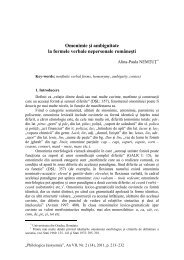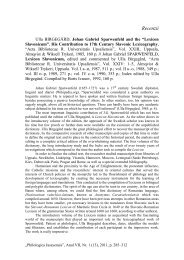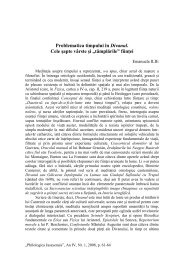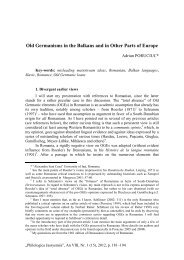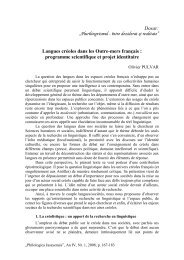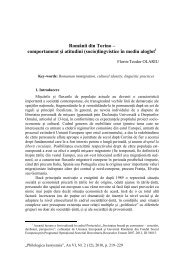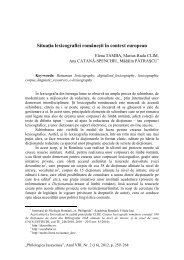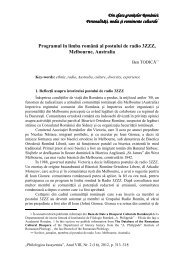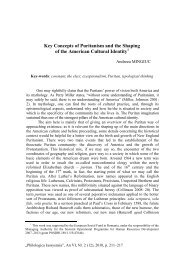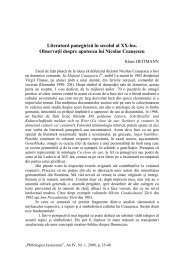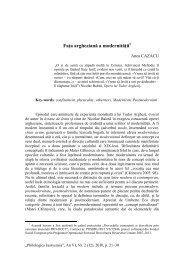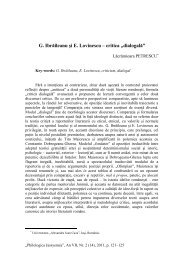Articol despre Stierle - Philologica Jassyensia
Articol despre Stierle - Philologica Jassyensia
Articol despre Stierle - Philologica Jassyensia
You also want an ePaper? Increase the reach of your titles
YUMPU automatically turns print PDFs into web optimized ePapers that Google loves.
A Romanian Literary Topic – The Baragan Plain<br />
proportion, the Baragan looks like a wasteland where the civilization has no<br />
meaning and seems to be unhistorical “scythic deserts”:<br />
It was only one hour since Felix was getting off the train, but he felt lost for<br />
hundreds of years in the places where any trace of civilization was destroyed long<br />
time ago by the sun and the vegetation (Calinescu 2000: 78–79).<br />
So, in Baragan, the absolute “master” are the sun and the vegetation. The time<br />
and even the space lost their real dimension: “Felix couldn’t realize if they were far<br />
at two hundred meters or a few kilometers” (Calinescu 2000: 77). Thus, from a<br />
literary description of the real geographical place to the identification of the plain<br />
with the Utopian region, this is the “road” between the descriptive fragments (in the<br />
classical manner) and the mythical and symbolical stories or novels.<br />
4. The Baragan – the fickle ocean<br />
In Odobescu’s essay regarding the hunting, the potential hunters scour “the<br />
desert of the Baragan”, and in front of them is always “the boundless space” with<br />
“the waves of grass” like a “fickle ocean”. In The Morometes also – “the light<br />
morning breeze… transforms the wheat into sea-waves.” This kind of comparison,<br />
with many words from the same lexical field Calinescu uses, too, in a memorable<br />
description of the Baragan in his novel Otilia’s Enigma. Some isolated trees in the<br />
empty field seemed “dead block stems on the waves of the sea”. The warm wind was<br />
“massive like a marine wave”. The travelers – Felix and Otilia – “were floating on a<br />
yellow-green sea, where the too much high waves hinder the eyes to put the horizon<br />
line in its place” (Calinescu 2000: 77–78).<br />
5. The Baragan – and its connotations<br />
A proper name (a certain place), but also a qualification – the word “Baragan”<br />
has a special connotation in the Romanian language. Panait Istrati, an “expert” in the<br />
Romanian plain, explains one. According to him, “everywhere in Romania, when a<br />
man is taking too many liberties in public”, he is apostrophized: “where do you think<br />
you are: on the Baragan?” Thus, the lack of boundaries is transferred to the people,<br />
to their behavior and way of understanding the world. In the same direction, but with a<br />
plus of connotation is another commonly used phrase: “It’s the end of the world,<br />
children. They are doing as they please with us. It’s like the Baragan.” Let’s do not<br />
forget that The Thistles of the Baragan is dedicated to “the Romanian people; to its<br />
eleven thousand sons murdered by the Romanian government” in the revolt from 1907!<br />
6. The Man and the Plain<br />
If Lucian Blaga invented the concept of “the mioritic space” as a<br />
philosophical manner to explain the Romanian soul and spirit through the Romanian<br />
landscape (“the undulating and infinite landscape” of hills and valleys), there are<br />
also other writers who described the behavior and the spirit of the peasant from the<br />
south of Romania through the mark of infinity and the monotonous relief of the<br />
plain. Marin Preda, considered one of the best Romanian contemporary writer sees<br />
the peasant from the Danube Plain as a thinker, a contemplative, in a “Socratic”<br />
13



